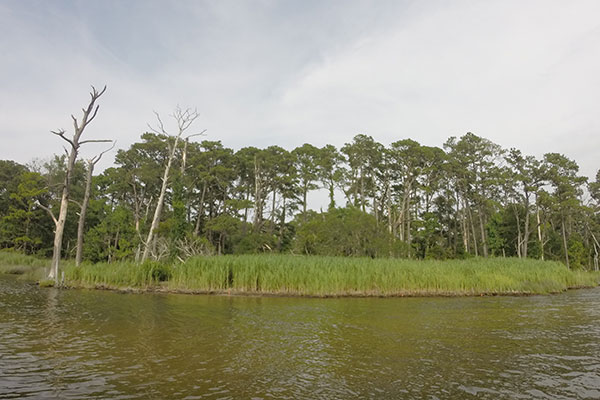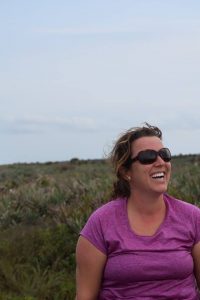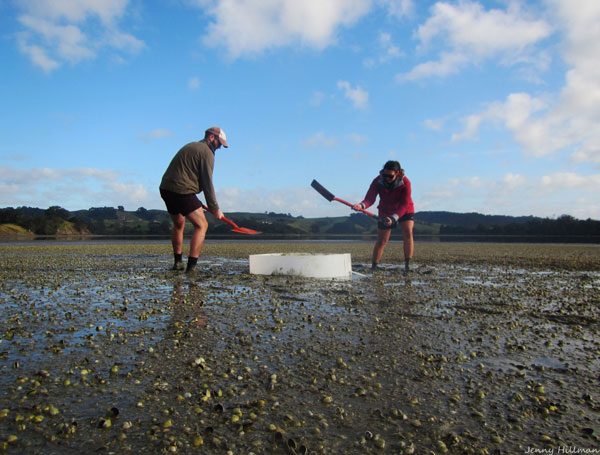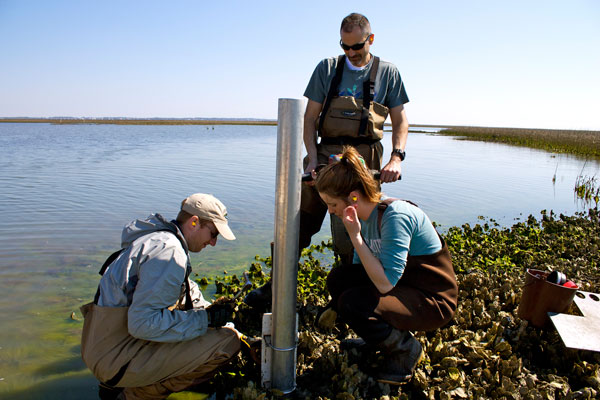Sept. 12, 2016
A fellowship that focuses on many pressing coastal management issues — including beach erosion, nutrient cycling and invasive species — has been jump-starting North Carolina graduate students’ careers since 2010.
Offered by North Carolina Sea Grant and the N.C. Coastal Reserve and National Estuarine Research Reserve, the opportunity has supported nine students since its inception — and trained many more.
The programs soon will release the latest joint call for applicants.

Kitty Hawk Woods Reserve has been a study site for a Coastal Reserve Fellow. Photo by Seth Theuerkauf
This fellowship emerged from a conversation between the programs, both seeking additional ways to work together, as well as fulfill each organization’s specific needs, notes John Fear, Sea Grant deputy director.
“We were looking for something that would be conducted within the Reserve boundaries, that was relevant to both programs and provided student training,” he recalls. “This fellowship has flourished into an outstanding partnership that benefits both programs.”
Fear has a unique perspective, having seen this fellowship from both programs’ points of view. He helped to initiate the N.C. Coastal Research Fellowship as the research coordinator at the Coastal Reserve. After joining Sea Grant as deputy director in 2013, Fear continued to champion this and other graduate student-training opportunities.
Sea Grant and the Coastal Reserve are state-based programs under the umbrella of the National Oceanic and Atmospheric Administration. North Carolina Sea Grant falls under NOAA’s Office of Oceanic and Atmospheric Research, while the Coastal Reserve’s federal “parent” is the NOAA Office for Coastal Management.

Kristen Hall was the first North Carolina Sea Grant/N.C. Coastal Reserve fellow. Courtesy Kristen Hall
The fellowship exposes students to each program’s complementary missions. Sea Grant seeks to provide unbiased, science-based information about the sustainable use and conservation of North Carolina’s ocean and coastal resources. The Coastal Reserve promotes informed management and stewardship of the state’s estuarine and coastal habitats through research, education and example by demonstrating good environmental practices. Both programs value the education of and outreach to students, residents and decision makers.
“Because the fellows conduct their research on site, using the Reserves as living laboratories, their results directly inform how we conserve, restore and manage the natural resources within these boundaries,” explains Brandon Puckett, Reserve research coordinator. “However, the applicability of their results to coastal management extends to state, regional and national scales.”
The inaugural recipient, Kristen Hall, was a master’s student from University of North Carolina Wilmington. She looked at long- and short-term changes on Masonboro Island from storms, beach renourishment, and inlet management through jetties and dredging.
She describes one accomplishment that stands out to her from the fellowship: “Walking the 9-mile island once a month with a 50-pound equipment pack. Rain, shine, cold or hot, you always had to go and collect your data.”
Hall is working on her doctoral degree in geological oceanography at Florida International University.

Former fellow Teri O’Meara, right, now is a post-doc at the University of Auckland in New Zealand. Photo by Jenny Hillman
As a fellow in 2013, Teri O’Meara learned her own lesson while traversing Rachel Carson Reserve to study bacterial and fungal denitrification. She sought out the gym to keep her legs strong. Her secret? “I never skimp on the lunges,” says O’Meara in an article in Coastwatch, Sea Grant’s magazine.
O’Meara, who received her doctoral degree from UNC-Chapel Hill’s Institute of Marine Sciences, now is a post-doctoral researcher at the University of Auckland in New Zealand. She studies the interactions between ecology and ecosystem function, and how humans can alter these interactions.
“In New Zealand, I am using the skills I learned as a Sea Grant and Reserve fellow to study the relationship between ecosystem function and the interacting effects of sea-level rise, nutrient pollution and sediment pollution,” O’Meara says.

Justin Ridge, left, studies oyster reefs. Photo by Emily Woodward
Justin Ridge, a 2014 fellow, studied oyster reefs in the Rachel Carson Reserve. He received a 2014 National Oceanic Atmospheric Administration Walter B. Jones Memorial Award for Excellence in Coastal and Marine Graduate Study for his fellowship research. He is completing his doctorate this fall at IMS.
“One of the most rewarding aspects of the Coastal Research Fellowship was the opportunity to mentor an undergraduate student in marine science. She now has developed her own research project to further understand how marshes and oyster reefs are affecting each other, which will be part of her master’s thesis,” Ridge explains.
“It’s a win-win for both programs,” Fear points out. “The Reserve gets work done on its properties by very capable graduate students. Sea Grant gets to broaden its reach to new faculty members, provide training and outreach, and add more research topics to our portfolio.”
In the long run, this is a way of ensuring treasured coastal resources remain available for all to enjoy.
“Research and education — the crux of the fellowship — are central to the Reserve’s mission. We believe it is critically important to support the education and development of our future leaders in coastal science and management so that we continue to value and protect coastal and estuarine ecosystems for future generations,” Puckett says. “In a way, we’re paying it forward.”
Check out Sea Grant’s map showing where past fellows are now, including the Coastal Reserve Fellows. Go to the fellowship page to find out more about this opportunity and to read articles and blog posts about the fellows’ research.
As part of its 50th anniversary, the National Sea Grant College Program is celebrating healthy coastal habitats in September. Look for more posts tagged with #MyCoast and #SeaGrant50 on social media. The short link for this story is go.ncsu.edu/oww27d.